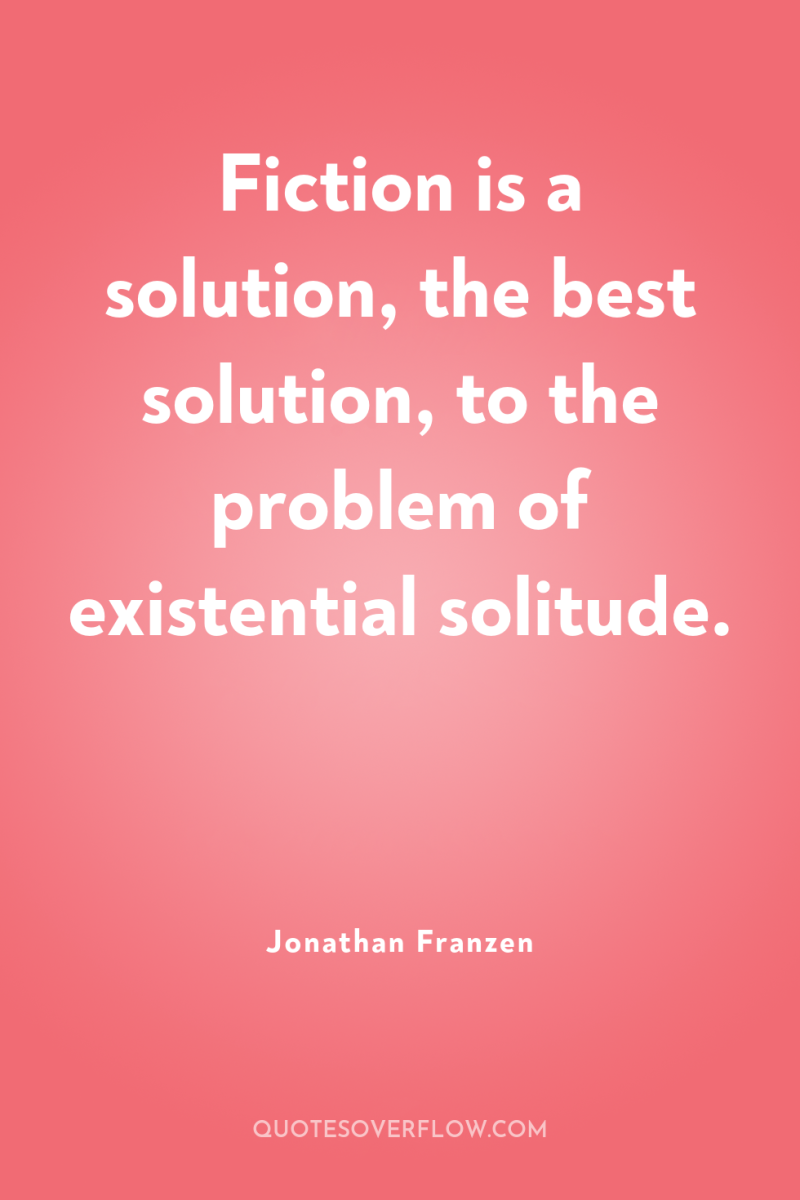
1
Fiction is a solution, the best solution, to the problem of existential solitude.Jonathan Franzen
2
I'm starting to think paradise isn't eternal contentment. It's more like there's something eternal about feeling contented. There's no such thing as eternal life, because you're never going to outrun time, but you can still escape time if you're contented, because then time doesn't matter.Jonathan Franzen
3
Every good writer I know needs to go into some deep, quiet place to do work that is fully imagined. And what the Internet brings is lots of vulgar data. It is the antithesis of the imagination. It leaves nothing to the imagination.Jonathan Franzen
4
He was lovable the way a child is lovable, and he was capable of returning love with a childlike purity. If love is nevertheless excluded from his work, it's because he never quite felt that he deserved to receive it. He was a lifelong prisoner on the island of himself. What looked like gentle contours from a distance were in fact sheer cliffs. Sometimes only a little of him was crazy, sometimes nearly all of him, but, as an adult, he was never entirely not crazy. What he'd seen of his id while trying to escape his island prison by way of drugs and alcohol, only to find himself even more imprisoned by addiction, seems never to have ceased to be corrosive of his belief in his lovability. Even after he got clean, even decades after his late-adolescent suicide attempt, even after his slow and heroic construction of a life for himself, he felt undeserving. And this feeling was intertwined, ultimately to the point of indistinguishability, with the thought of suicide, which was the one sure way out of his imprisonment; surer than addiction, surer than fiction, and surer, finally, than love.Jonathan Franzen
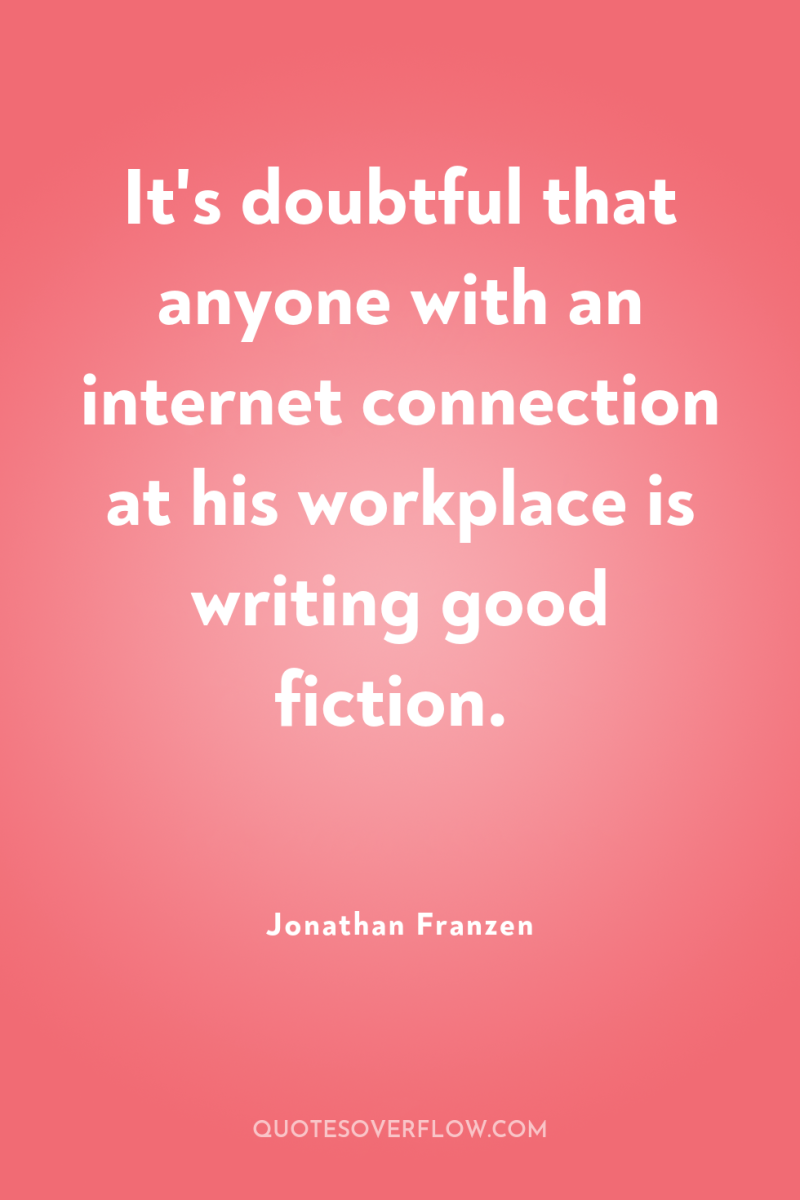
5
It's doubtful that anyone with an internet connection at his workplace is writing good fiction.Jonathan Franzen
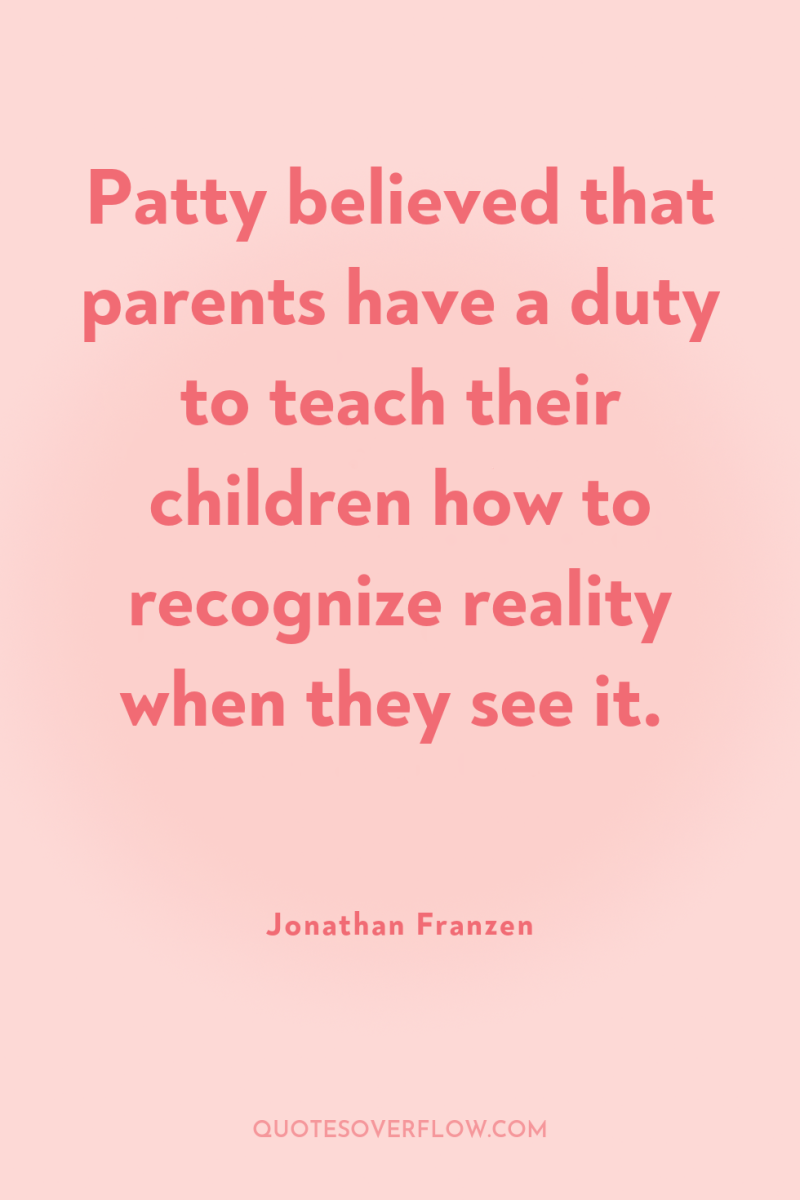
6
Patty believed that parents have a duty to teach their children how to recognize reality when they see it.Jonathan Franzen
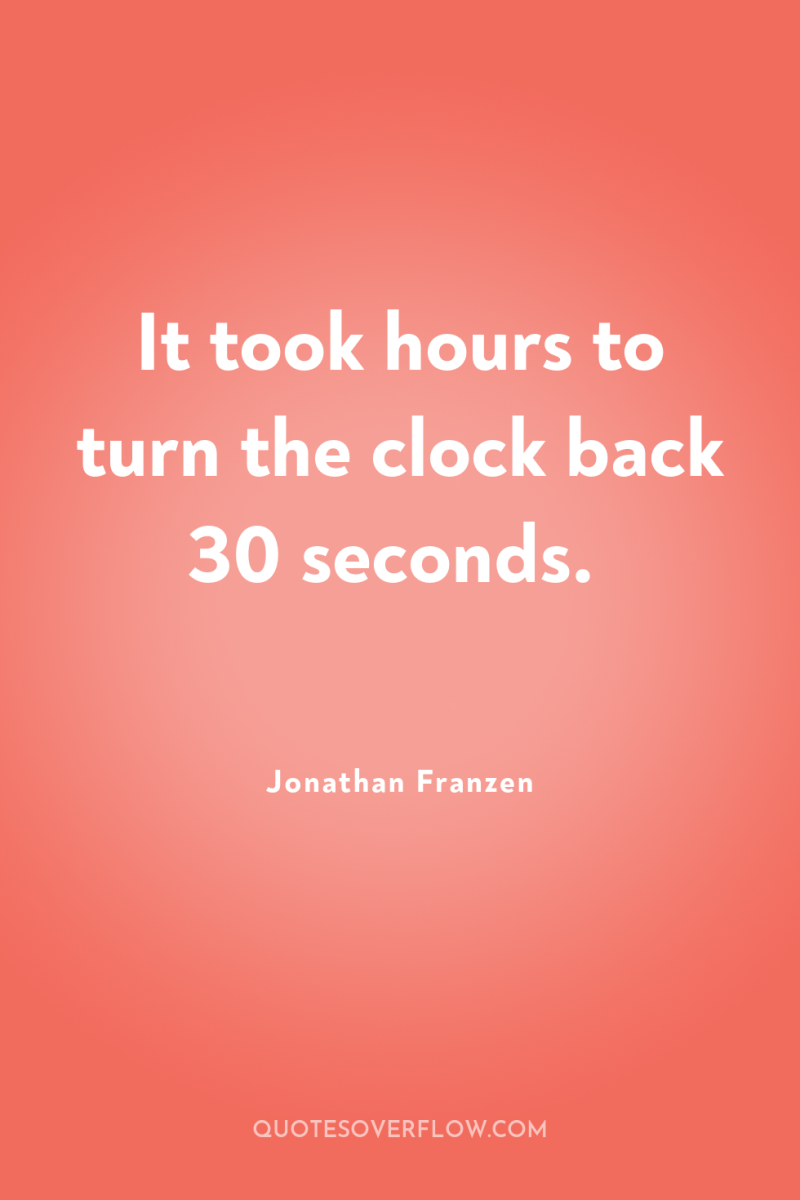
7
It took hours to turn the clock back 30 seconds.Jonathan Franzen
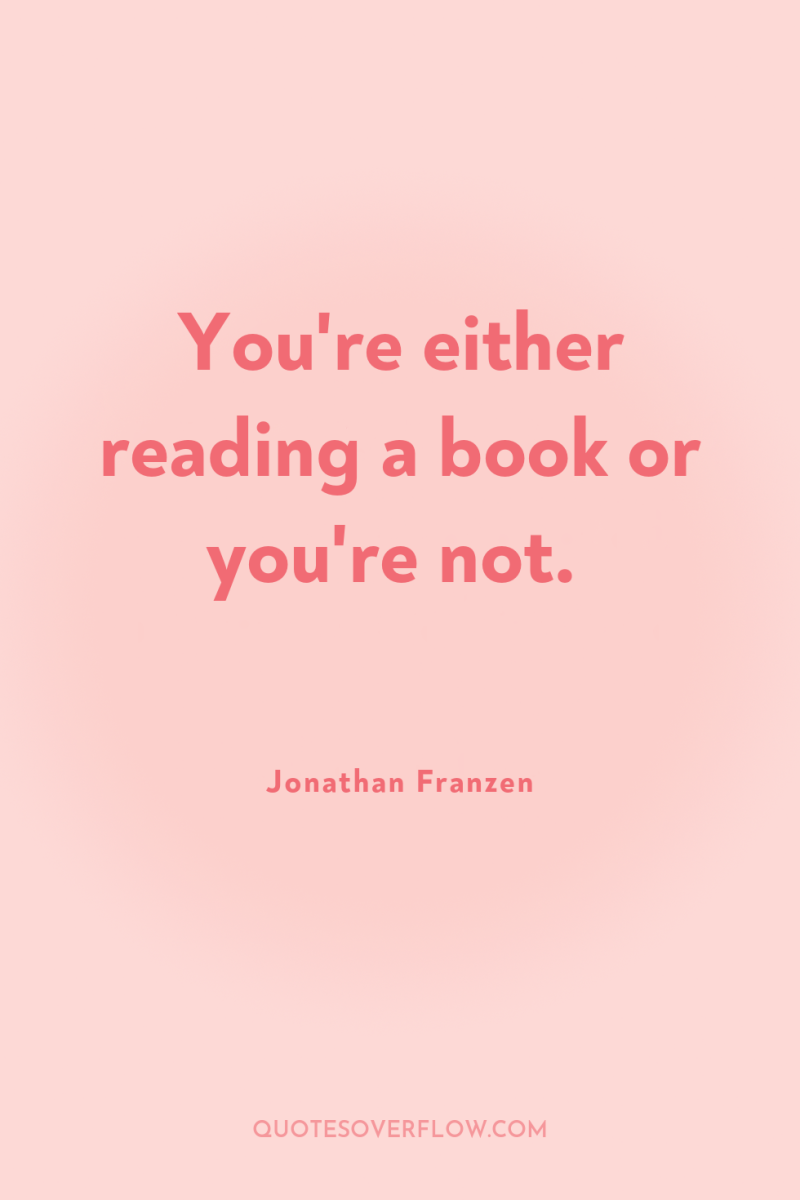
8
You're either reading a book or you're not.Jonathan Franzen
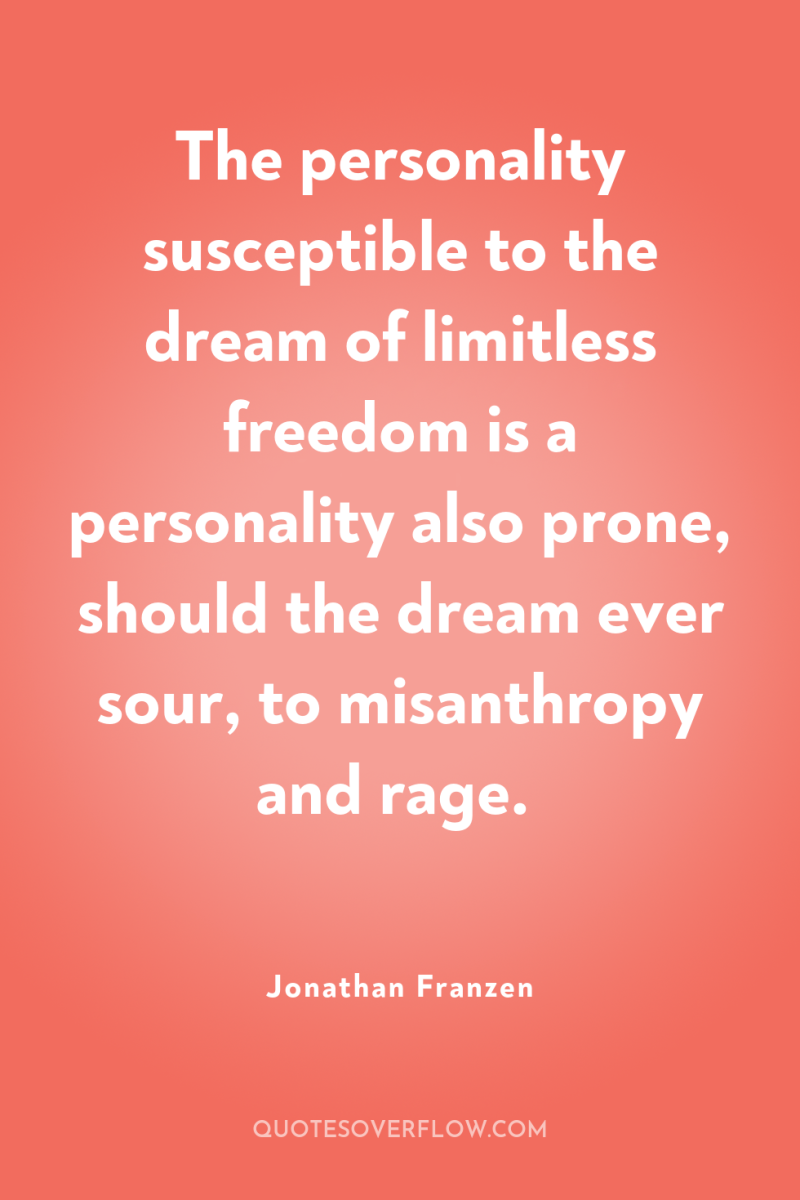
9
The personality susceptible to the dream of limitless freedom is a personality also prone, should the dream ever sour, to misanthropy and rage.Jonathan Franzen
10
An odd thing about beauty, however, is that it's absence tends not to arouse our sympathy as much as other forms of privation do.Jonathan Franzen
11
Reading enables me to maintain a sense of something substantive— my ethical integrity, my intellectual integrity.Jonathan Franzen
12
[P]art of having a complicated mind was understanding its limits, understanding that it couldn't think of everything. Stupidity mistook itself for intelligence, whereas intelligence knew its own stupidity.Jonathan Franzen
13
Love is about bottomless empathy, born out of the heart’s revelation that another person is every bit as real as you are. And this is why love, as I understand it, is always specific. Trying to love all of humanity may be a worthy endeavor, but, in a funny way, it keeps the focus on the self, on the self’s own moral or spiritual well-being. Whereas, to love a specific person, and to identify with his or her struggles and joys as if they were your own, you have to surrender some of your self. .Jonathan Franzen
14
Nice people don't necessarily fall in love with nice people.Jonathan Franzen
15
If you were looking aside and mentally adding up the hours until the execution of a young killer, all that registered was something dark flashing by. But if you happened to be gazing directly at the window in question and you happened as well to be feeling unprecedentedly calm, four-tenths of a second was more than enough time to identify the falling object as your husband of forty-seven years.Jonathan Franzen
16
Their marriages had been Old Testament, hers a matter of honoring her covenant with Charles, Tom's a matter of fearing Anabel's wrath and judgement. In the New Testament, the only things that mattered were love and free will.Jonathan Franzen
17
The Astors and the Vanderbilts, their pleasure domes and money: she was sick of it. Sick of envying, sick of herself. She didn't understand antiques or architecture, she couldn't draw like Sylvia, she didn't read like Ted, she had few interests and no expertise. A paucity for love was the only true thing she'd ever had.Jonathan Franzen
18
[H]er mind was like a balloon with static cling, attracting random ideas as they floated by[.]Jonathan Franzen
19
If you choose to spend an hour every day tinkering with your Facebook profile, or if you don’t see any difference between reading Jane Austen on a Kindle and reading her on a printed page, or if you think Grand Theft Auto IV is the greatest Gesamtkunstwerk since Wagner, I’m very happy for you, as long as you keep it to yourself.Jonathan Franzen
20
The weekly thirty minutes of sexual stress was a chronic but low-grade discomfort, like the humidity in FloridaJonathan Franzen
21
Parents are programmed to want the best for their kids, regardless of what they get in return. That's what love is supposed to be like, right? But in fact, if you think about it, that's kind of a strange belief. Given what we know about the way people really are. Selfish and shortsighted and egotistical and needy. Why should being a parent, in and of itself, somehow confer superior-personhood on everybody who tries it? Obviously it doesn't.Jonathan Franzen
22
My conception of a novel is that it ought to be a personal struggle, a direct and total engagement with the author's story of his or her own life. This conception, again, I take from Kafka, who, although he was never transformed into an insect, and although he never had a piece of food (an apple from his family's table! ) lodged in his flesh and rotting there, devoted his whole life as a writer to describing his personal struggle with his family, with women, with moral law, with his Jewish heritage, with his Unconscious, with his sense of guilt, and with the modern world. Kafka's work, which grows out of the nighttime dreamworld in Kafka's brain, is *more* autobiographical than any realistic retelling of his daytime experiences at the office or with his family or with a prostitute could have been. What is fiction, after all, if not a kind of purposeful dreaming? The writer works to create a dream that is vivid and has meaning, so that the reader can then vividly dream it and experience meaning. And work like Kafka's, which seems to proceed directly from dream, is therefore an exceptionally pure form of autobiography. There's an important paradox here that I would like to stress: the greater the autobiographical content of a fiction writer's work, the *smaller* its superficial resemblance to the writer's actual life. The deeper the writer digs for meaning, the more the random particulars of the writer's life become *impediments* to deliberate dreaming. .Jonathan Franzen
23
I think the i Pod is the true face of Republican politics, and I’m in favor of the music industry … standing up proud and saying it out loud: We in the Chiclet-manufacturing business are not about social justice, …we’re not about a coherent set of national ideals, we’re not about wisdom. We’re about choosing what WE want to listen to and ignoring everything else…. We’re about giving ourselves a mindless feel-good treat every five minutes. …We’re about persuading ten-year-old children to spend twenty-five dollars on a cool little silicone i Pod case that costs a licensed Apple Computer subsidiary thirty-nine cents to manufacture. .Jonathan Franzen
24
THE CORRECTION, when it finally came, was not an overnight bursting of a bubble but a much more gentle letdown, a year-long leakage of value from key financial markets, a contraction too gradual to generate headlines and too predictable to seriously hurt anybody but fools and the working poor.Jonathan Franzen
25
The madness of an autumn prairie cold front coming through...ringing throughout the house was an alarm bell that no one but Alfred and Enid could hear directly.Jonathan Franzen
26
Plato laments the decline of the oral tradition and the atrophy of memory which writing induces, I at the other end of the Age of the Written Word am impressed by the sturdiness and reliability of words on paper... The will to record indelibly, to set down stories in permanent words, seems to me akin to the conviction that we are larger than our biologies.Jonathan Franzen
27
And did the distress I was feeling derive from some internal sickness of the soul, or was it imposed on me by the sickness of society? That someone besides me had suffered from these ambiguities and had seen light on their far side... that I could find company and consolation and hope in an object pulled almost at random from a bookshelf–felt akin to an instance of religious grace.Jonathan Franzen
28
In order to justify their claim on our attention, the organs of mass culture and information are compelled to offer something "new" on a daily, indeed hourly, basis. Although good novelists don't deliberately seek out trends, many of them feel a responsibility to pay attention to contemporary issues, and they now confront a culture in which almost all of the issues are burned out almost all the time. The writer who wants to tell a story about society that's true not just in 1996 but in 1997 as well can find herself at a loss for solid cultural referents. What's topically relevant while she's planning the novel will almost certainly be passé by the time it's written, rewritten, published, distributed, and read. .Jonathan Franzen
29
When I'm writing I don't want anyone else in the room - including myself.Jonathan Franzen
30
Depression presents itself as a realism regarding the rottenness of the world in general and the rottenness of your life in particular. But the realism is merely a mask for depression's actual essence, which is an overwhelming estrangement from humanity. The more persuaded you are of your unique access to the rottenness, the more afraid you become of engaging with the world; and the less you engage with the world, the more perfidiously happy-faced the rest of humanity seems for continuing to engage with it.Jonathan Franzen
31
The problem with making a virtual world of oneself is akin to the problem with projecting ourselves onto a cyberworld: there’s no end of virtual spaces in which to seek stimulation, but their very endlessness, the perpetual stimulation without satisfaction, becomes imprisoning.Jonathan Franzen
32
There's the imperative to keep secrets, and the imperative to have them known. How do you know that you're a person, distinct from other people? By keeping certain things to yourself. You guard them inside you, because, if you don't, there's no distinction between inside and outside. Secrets are the way you know you even have an inside. A radical exhibitionist is a person who has forfeited his identity. But identity in a vacuum is also meaningless. Sooner or later, the inside of you needs a witness. Otherwise you're just a cow, a cat, a stone, a thing in the world, trapped in your thingness. To have an identity, you have to believe that other identities equally exist. You need closeness with other people. And how is closeness built? By sharing secrets. Your identity exists at the intersection of these lines of trust. .Jonathan Franzen
33
And if the world refused to square with his version of reality then it was necessarily an uncaring world, a sour and sickening world, a penal colony, and he was doomed to be violently lonely in it. He bowed his head at the thought of how much strength a man would need to survive an entire life so lonely.Jonathan Franzen
34
What lived on-in me- was the discomfort of how completely I'd outgrown the novel I'd once been so happy to live inJonathan Franzen
35
We who were not so pathologically far out on the spectrum of self-involvement, we dwellers of the visible spectrum who could imagine how it felt to go beyond violet but were not ourselves beyond it, could see that David was wrong not to believe in his lovability and could imagine the pain of not believing in it. How easy and natural love is if you are well! And how gruesomely difficult--what a philosophically daunting contraption of self-interest and self-delusion love appears to be--if you are not! And yet .. the difference between well and not well is in more respects a difference of degree than of kind. Even though David laughed at my much milder addictions and liked to tell me that I couldn't even conceive of how moderate I was, I can still extrapolate from these addictions, and from the secretiveness and solipsism and radical isolation and raw animal craving that accompany them, to the extremity of his. I can imagine the sick mental pathways by which suicide comes to seem like the one consciousness-quenching substance that nobody can take away from you.Jonathan Franzen
36
There’s hardly anybody who doesn’t hate somebody now, and nobody at all whom somebody doesn’t hate.Jonathan Franzen
37
.. It happened very fast. And now that he's dead he can't remember pain. It's as if he'd never existed.' He wanted her to believe this, but he wasn't sure he believed it himself. If time was infinite, then three seconds and three years represented the same infinitely small fraction of it. And so, if inflicting three years of fear and suffering was wrong, as everyone would agree, then inflicting three seconds of it was no less wrong. He caught a fleeting glimpse of God in the math here, in the infinitesimal duration of a life. No death could be quick enough to excuse inflicting pain. If you were capable of doing the math, it meant that a morality was lurking in it.Jonathan Franzen
38
You could slap his wrist for saying it, but then he said it with his face, and you could spank him for making faces, but then he said it with his eyes, and there were limits to correction–no way, in the end, to penetrate behind the blue irises and eradicate a boy’s disgust.Jonathan Franzen
39
You thought you knew what food was, you thought it was elemental. You forgot how much restaurant there was in restaurant food and how much home was in homemade.Jonathan Franzen
40
By now it was too late to call St. Jude. He chose an out-of-the-way patch of airport carpeting and lay it down to sleep. He didn't understand what had happened to him. He felt like a piece of paper that had once had coherent writing on it but had been through the wash. He felt roughened, bleached and worn out along the fold lines. He semi-dreamed of disembodied eyes and isolated mouths in ski masks. He'd lost track of what he wanted, and since who a person was was what a person wanted, you could say that he'd lost track of himself.Jonathan Franzen
41
She had all day every day to figure out some decent and satisfying way to live, and yet all she ever seemed to get for all her choices and all her freedom was more miserable. The autobiographer is almost forced to the conclusion that she pitied herself for being so free.Jonathan Franzen
42
She pondered the arrangements of the paintings on a wall like a writer pondered commas.Jonathan Franzen
43
It's nice to be able to control my smell environment, and I can hear myself think better when it's quiet. It wasn't easy to become a person who's OK being alone on a Saturday night, but I did the work, I got there...Jonathan Franzen
44
In terms of having an experience, seriously contemplating a murder was almost as good as going through with it, and it had the added benefit of not entailing risk. Between prison and no prison, no prison was clearly preferable.Jonathan Franzen
45
Since our technology is really just an extension of ourselves, we don’t have to have contempt for its manipulability in the way we might with actual people. It’s all one big endless loop. We like the mirror and the mirror likes us. To friend a person is merely to include the person in our private hall of flattering mirrors.Jonathan Franzen
46
The ultimate goal of technology, the telos of techne, is to replace a natural world that’s indifferent to our wishes – a world of hurricanes and hardships and breakable hearts, a world of resistance – with a world so responsive to our wishes as to be, effectively, a mere extension of the self.Jonathan Franzen
47
In Technology We Trust. Need to put that on the new hundred-dollar bill.Jonathan Franzen
48
It was a way of recognizing places of enchantment: people falling asleep like this.Jonathan Franzen
49
Only in a crowded, diverse place like New York, surrounded by strangeness, do I come home to myself.Jonathan Franzen
50
The reason they outperformed her was that they accepted each new “product” without trying to understand it. They got behind the new pitch wholeheartedly, even when it was risible and/or made no sense, and then, if a prospective customer had trouble understanding the “product, ” they didn’t vocally agree that it sure was difficult to understand, didn’t make a good-faith effort to explain the complicated reasoning behind it, but simply kept hammering on the written pitch. And clearly this was the path to success, and it was all a double disillusionment to Pip, who not only felt actively punished for using her brain but was presented every month with fresh evidence that Bay Area consumers on average responded better to a rote and semi-nonsensical pitch than to a well-meaning saleswoman trying to help them understand the offer.Jonathan Franzen
51
The mark of a legitimate revolution - the scientific, for example - was that it didn't brag about its revolutionariness but simply occurred.Jonathan Franzen
52
Walter had never liked cats. They'd seemed to him the sociopaths of the pet world, a species domesticated as an evil necessary for the control of rodents and subsequently fetishized the way unhappy countries fetishize their militaries, saluting the uniforms of killers as cat owners stroke their animals' lovely fur and forgive their claws and fangs. He'd never seen anything in a cat's face but simpering incuriosity and self-interest; you only had to tease one with a mouse-toy to see where it's true heart lay..cats were all about using people .Jonathan Franzen
53
The fundamental fact about all of us is that we’re alive for a while but will die before long. This fact is the real root cause of all our anger and pain and despair. And you can either run from this fact or, by way of love, you can embrace it.Jonathan Franzen
54
Reading Chip's college orientation materials, Alfred had been struck by the sentence New England winters can be very cold. The curtains he'd bought at Sears were of a plasticized brown-and-pink fabric with a backing of foam rubber. They were heavy and bulky and stiff. "You'll appreciate these on a cold night, " he told Chip. "You'll be surprised how much they cut down drafts." But Chip's freshman roommate was a prep-school product named Roan McCorkle who would soon be leaving thumbprints, in what appeared to be Vaseline, on the fifth-grade photo of Denise. Roan laughed at the curtains and Chip laughed, too. He put them back in the box and stowed the box in the basement of the dorm and let it gather mold there for the next four years. He had nothing against the curtains personally. They were simply curtains and they wanted no more than what any curtains wanted - to hang well, to exclude light to the best of their ability, to be neither too small nor too large for the window that it was their task in life to cover; to be pulled this way in the evening and that way in the morning; to stir in the breezes that came before rain on a summer night; to be much used and little noticed. There were numberless hospitals and retirement homes and budget motels, not just in the Midwest but in the East as well, where these particularly brown rubber-backed curtains could have had a long and useful life. It wasn't their fault that they didn't belong in a dorm room. They'd betrayed no urge to rise above their station; their material and patterning contained not a hint of unseemly social ambition. They were what they were. If anything, when he finally dug them out of the eve of graduation, their virginal pinkish folds turned out to be rather less plasticized and homely and Sears-like than he remembered. They were nowhere near as shameful as he'd thought.Jonathan Franzen
55
Tom's theory of why human beings had yet to receive any message from extraterrestrial intelligences was that all civilizations, without exception, blew themselves up almost as soon as they were able to get a message out, never lasting more than a few decades in a galaxy whose age was billions; blinking in and out of existence so fast that, even if the galaxy abounded with earthlike planets, the chances of one civilization sticking around to get a message from another were vanishingly low, because it was too damned easy to split the atom.Jonathan Franzen
56
How could I have thought that I needed to cure myself in order to fit into the 'real' world? I didn't need curing, and the world didn't, either; the only thing that did need curing was my understanding of my place in it. Without that understanding - without a sense of belonging to the real world - it was impossible to thrive in an imagined one.Jonathan Franzen
57
He was certifiably insane, an Ayn Rander who fancied himself an Ãœbermensch and “the Singularity’s chosen avatar,Jonathan Franzen
58
Pip wondered what the secret was of being different in a way that attracted people, as opposed to her own way.Jonathan Franzen
59
There was no arguing with blood.Jonathan Franzen
60
Brooklyn was like Philadelphia made better by its proximity to Manhattan.Jonathan Franzen
61
And yet the feeling of injustice itself turned out to be strangely physical. Even realer, in a way, than a her hurting, smelling, sweating body. Injustice had a shape, an a weight, and a temperature, and a texture, and a very bad taste.Jonathan Franzen
62
It's healthy to say uncle when your bone's about to break.Jonathan Franzen
63
There are few things harder to imagine than other people’s conversations about yourself.Jonathan Franzen